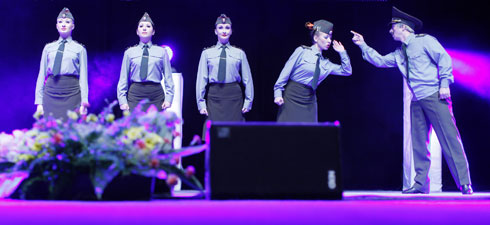For most Czechs, the Red Army invaders who for decades shored up the country's hideous communist regime by force of arms will always be a bitter memory. But now the citizens of the onetime Soviet satellite have fresh cause for concern in the shape of a new wave of Russian arrivals. Let's not forget that they come from a country that Czech Republic Interior Ministry reports still classify as a potential sponsor of "espionage and a threat to national security."
These days, if the surveys are believed, Czechs are beginning to get used to the people they call "our Russians." As Alexei Kelin, a former member of the government council for national minorities, explains, "The Russians who live in the Czech Republic are largely middle class." He adds that very wealthy Russians tend to be attracted by life in London or in Paris, but those who live in the Czech Republic appreciate the fact that it is " cheaper than the West." The statistics show that at least half of the Czech Republic's Russians are university graduates, and more generally that they have virtually no involvement in crime — most of them are small-scale entrepreneurs in real estate, clothing and souvenir sales, and IT services. In 1997, there was only one Russian shop, and one Russian hairdressers in Prague. Today, the website of the Russian language newspaper Pražskij Express lists 24 shops selling Russian produce, 15 hairdressers, and five Russian and Ukrainian university offices.
The Russians tend to rely heavily on family ties, and for the most part do not establish links within their community. "70% of our customers are Russian," says Iolanta Avanessian, owner of the Arbat Russian delicatessen. "But that is not to say that our shop is a community centre. Far from it! The people who come here pay for their shopping, and then off they go. They don't make friends." This is also the opinion of Alexei Kelin, who takes the view that the Russians "tend to be mistrustful of people and institutions."
Sour relations with Mother Russia
Two magazines with offices in the Prague neighbourhood close to the I.P. Pavlova underground station — Artek and Rousskoïe Slovo — are now targeting the young people "of the Russian diaspora living in the Czech Republic." Anna Khlebinova is a regular contributor. "We are not really political, more of a cultural association. But what we write and publish is already more than enough to sour relations with the Russian embassy," which used to provide a source of funding. One of the projects in which Khlebinova participated lies on the table: a 1,000-page tome which recounts the lives of Russian artists, army officers and doctors, who sought refuge in Czechoslovakia before the Bolsheviks came to power in 1948. When the time came to publish the book, a representative of the embassy threatened to withdraw funding if entire chapters of the manuscript were not deleted. "We had written that in the aftermath of World War II, the Soviet secret service sent a large number of people to the Gulag. That was the source of the problem," explains Khlebinova. The manuscript, which remained unchanged, was finally published with help from the main funder and president of the Association for Russian Traditions, Igor Zolotarev.
It is important to draw a distinction between Russian students and entrepreneurs, who have chosen to live in the Czech Republic because it offers a more secure environment with a better quality of life than the one they enjoyed in Russia, and the representatives of major Russian companies controlled by the Kremlin. "I think we should be enthusiastic about the presence of the first group. They made a free and fully informed choice not to live in modern-day Russia. And they demonstrate a critical view of their country in seeking an alternative," notes Michael Romancov, a descendant of anti-Bolshevik Russian immigrants, who teaches political geography at the Social Sciences Faculty of Charles University. "With regard to the second group, I think we should be very wary. The Czech state is right to consider them a threat to security."
Was this article useful? If so we are delighted!
It is freely available because we believe that the right to free and independent information is essential for democracy. But this right is not guaranteed forever, and independence comes at a cost. We need your support in order to continue publishing independent, multilingual news for all Europeans.
Discover our subscription offers and their exclusive benefits and become a member of our community now!












